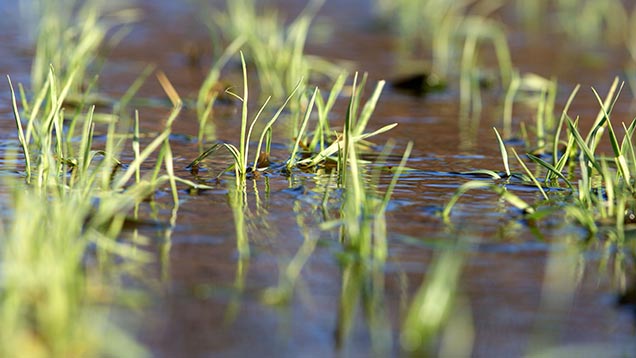Scientists create barley variety more resistant to flooding
 (c) Tim Scrivener
(c) Tim Scrivener Scientists in the UK have bred a barley variety which is better able to tolerate flooding and waterlogged conditions.
Researchers at the University of Nottingham have identified the mechanism used by plants in stress conditions to sense new oxygen levels.
This breakthrough has helped them use advanced breeding techniques to breed barley cultivars that reduce yield loss in waterlogged fields.
See also: Flooded fields mean anxious wait for farmers
“Barley cultivars with the capability to withstand waterlogging have excellent growth, superior yields, retain their green appearance due to chlorophyll retention and have a more efficient metabolism even in low-oxygen conditions.”
Michael Holdsworth, Nottingham University
“We now know how to breed barley cultivars more tolerant to waterlogging and flooding,” said Michael Holdsworth, professor of crop science at Nottingham University.
“Barley cultivars with the capability to withstand waterlogging have excellent growth, superior yields, retain their green appearance due to chlorophyll retention and have a more efficient metabolism even in low-oxygen conditions.”
One year ago, farmers in the south and south-west of England struggled with unprecedented flooding, which wiped out many thousands of acres of crops and grassland.
Across the world, farmers are falling victim to the increasing frequency of catastrophic flooding events.
Plants starved of oxygen cannot survive flooding for long periods of time. Persistent flooding and saturated arable land can wipe out crops and reduce harvests, so the search for flood-tolerant crops is a key target for global food security.
Barley is comparatively more susceptible to waterlogging than other cereals. Average yields can be reduced by up to 50% as a result of waterlogging.
Resistance to this stress is an important objective of breeding efforts in high-rainfall areas of the world.
Prof Holdsworth said: “We now have the strategy developed for plant breeding to select for enhanced tolerance to waterlogging in barley and other crops.”
The latest development has been published in a report in Plant Biotechnology Journal.
This research brought together experts from Nottingham University’s Schools of Biosciences and Mathematical Sciences, the University of Silesia, SABMiller and the Pierre et Marie Curie University in Paris.

